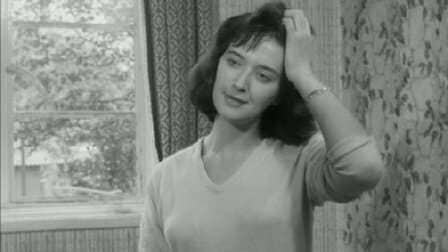Shelagh Delaney the Salford-born child-prodigy author of the ground-breaking, hugely influential — and touchingly funny — 1958 play ‘A Taste of Honey’ died at the weekend from cancer, aged 71.
Below is a classic Monitor profile of Delaney and Salford from 1960, directed by Ken Russell, no less. Fifty years on Delaney the provincial working class girl comes across as very modern and relaxed in front of the BBC cameras — albeit in a slightly dreamy, introspective way that isn’t in fact very modern at all, alas. We don’t really have time for such things now.
When I first saw this a few years back I felt young Shelagh was someone I might actually know myself, someone I might have popped round for tea and a gossip with, even though I was born several years after this film was made.
Note how the semi-detached she’s living in bears a strong resemblance to the one a certain Steven Patrick was raised in, just down the road in Stretford. (And the one in this recent ad.)
Delaney is infectiously passionate about working class Salford, captured here in a perfect little time-capsule, a fragment of a lost civilisation, before the docks and the chimneys and the back-to-back sense of community and pride was swept away by the 60s and 70s and those ugly new houses. She talks repeatedly in the doc about being rooted there — and how she gets homesick whenever she travels. It’s the perfect place for a writer:
“The language is alive, it’s virile, it lives and it breathes and you know exactly where it’s coming from. Right out of the earth…”.
“Down by the river it’s even romantic, if you can stand the smell.”
The quip about the river almost sounds like a Morrissey lyric….
Which reminds me: look out for the middle-aged male Salford market trader wearing Dame Edith Sitwell’s earrings: “He’s been here for years — and always wears those earrings.”
Postscript
You can read a tribute to Shelagh Delaney by the Manchester writer Dave Haslam here.
Tip: Philip

Yes, the boy seemed to have been cast as a possible Mini Moz (before The Separation). Even the punchline, where it turns out he couldn’t wait for Xmas Day because he was dying to give his Mam and Dad prezzies is Morrisseyean in its adult-child, boy-girl reversal. (Boys aren’t supposed to care about such soppy things as giving prezzies.)
Morrissey plays an Edith Sitwell interview during the intermission of his current tour.
Morrissey was raised in Hulme until he was 11 but I did notice not only the similar suburban semi but the boy’s resemblance to Morrissey.
(It must be deliberate)
Comments are closed.